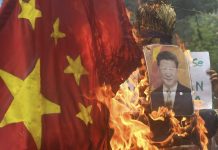The Annual Report on Religious Freedom, released this year has turned quite a few heads at the increasing atrocities towards minorities across the globe especially in China, Pakistan and Saudi Arabia. The US Secretary of State, Mike Pompeo had a few scathing statements regarding the state of affairs on global religious freedom. The findings along with the statements made by Pompeo been a cause of many foreign states going on the offensive and calling the report ‘biased’ and ‘incendiary’ in nature.
The report is an overview of the large-scale atrocities addressed across 28 nations. It talks about the many governments and non-government actors targeting religious minorities. According to the report, religious freedom continues to deteriorate across the globe. The most violent crimes included genocide, religious marginalisation, forced displacement, rape, enslavement and other such activities that curtail humanity.
One of the major topics of heated discussion was upon the stringent blasphemy laws that impinge the freedom of religious expression in Pakistan. The Secretary of State Mike Pompeo, speaking at the release of the report, estimated that there are more than 40 people who are presently serving life sentences or facing execution for blasphemy in Pakistan.
Aasiya Bibi, a Pakistani-Christian, was convicted of blasphemy in 2010 and sentenced to death. Bibi was found guilty for insinuating curses at the Islamic faith. The law of land for blasphemy in Pakistan includes life imprisonment and/or death.
There were many threats to her family and many Islamic clerics had openly put up a bounty for her death. Among those in support of her acquittal were harassed and physically harmed or even killed. Despite public protests against her, Bibi was acquitted on appeal in 2018 and allowed to leave for Canada.
Pompeo also criticised the Chinese government for its strong and violent persecution of the Muslim Uighurs in Xinjiang province. As an ethnic minority, the Uighurs, have been reportedly kept in “conditions similar to internment camps”. The Human Rights Watch suggests that the Uighur community is being subjected to intense surveillance and media are almost completely banned from the area.
Allegedly anyone found to contact abroad is being targeted and systematically punished. The State Department added that the abuses of religious freedom in China and especially in the Xinjiang province is unbelievable.
“In China, the government’s intense persecution of many faiths – Falun Gong practitioners, Christians, and Tibetan Buddhists among them – is the norm,” Pompeo said. The statement alluding to the systematic oppression of the Falun Gong spiritual movement over the feigned idea that the movement is supposedly ‘superstitious in nature and a foreign-driven menace to society’.
The Chinese government has reportedly persecuted almost 3000 documented practitioners. The other instances of persecution of Tibetan Buddhists and Christians have long been Party Headquarters agenda. All these cases were specifically mentioned in the report about China.
A rather interesting development in this report is the criticism of Saudi Arabia. The Trump administration has often shied away from bad-mouthing Saudi Arabia owing to its bountiful vested trade interests. The detainment of more than thousand Shias for non-violent offences has been something that has been touched upon in the report, portraying discrimination on their part.
The rise of Crown Prince of Saudi Arabia, Mohammed Bin Salman Al Saud, has hardly been able to garner the same positive momentum that was initially found to be the case. Sam Brownback, Ambassador at-Large for International Religious Freedom, is of the view that the ascend of the Crown Prince has been rather disappointing.
“I think there was a lot of hope at first in the change of leadership that things would open up substantially. They continue to be one of the worst actors in the world on religious persecution. We need to see actions take place in a positive direction,” he told reporters.
In April, which was after the timeframe of the 2018 report, Saudi Arabia conducted a mass execution of 37 people, most of them Shiites. The charges of execution ranged from alleged involvement in terrorist activities, espionage and protest-related offences.
Humans Rights Watch (HRW) suggested that one of the Saudi Shias was crucified after being beheaded, while the UN rights chief said at least three of those executed were minors when charged. Among the 37 people charged, 33 of them were Shia, which makes the act premeditated.
Michael Paige, deputy Middle East Director at HRW, suggests that the Saudis are falsely claiming that the detainees had extremist tendencies and that there is an utter lack of due process in their conviction and execution. The ‘criminals’ were solely condemned on the basis of confessions that were credibly found to be coerced.
The various inputs within the report make for an interesting insight into the impending danger of incited violence from various actors that has seemingly led to a pandemic. During the press release of the report, Mike Pompeo announced that the United States would host the first-ever “Ministerial to Advance Religious Freedom”.
This Ministerial would bring together governments, religious community leaders, NGOs which focus on religious freedom and protection watch. This is being done to “drive the issue of religious freedom more aggressively globally” according to Ambassador Sam Brownback. This is an important and possibly an effective development in promoting religious freedom in foreign policy discourse.




